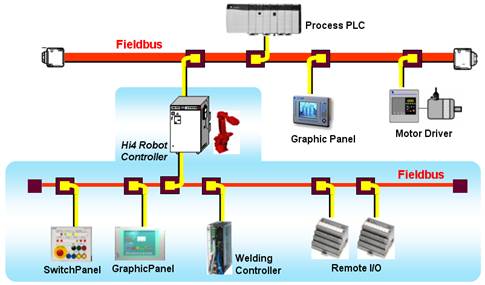1.2. About fieldbus
1.2. About fieldbus
Fieldbus is an open industrial standard for operating diverse devices such as sensors, buttons, motor drivers and manipulating interface in factories, by connecting them to PLC (Programmable Logic Controller) through a single cable line.
Fieldbus makes it possible to provide intelligent services such as centralized monitoring of the overall status of a network or centralized reconfiguration of the network. For example, when it comes to switches, fieldbus is advantageous because more detailed information (operation mode setting, sensor failure), not just about on/off status, can be sent and received.
As a single cable line is used for a field bus, the time and costs for wiring can be reduced. As the configuration of wiring is simple, fieldbus is advantageous in terms of maintenance. In addition, differently from protocols with non-deterministic response such as Ethernet, fieldbus guarantees a certain level of data response speed, making it possible to meet the requirements of some industries where critical time characteristic is important.

Figure 1.1 Fieldbus network, master and slave units
One master and multiple slaves are connected trough one fieldbus network. The master searches and manages the overall network and exchange data with slaves. Generally speaking, a PLC is a master and other units, such as sensors, buttons, and controllers are slaves.